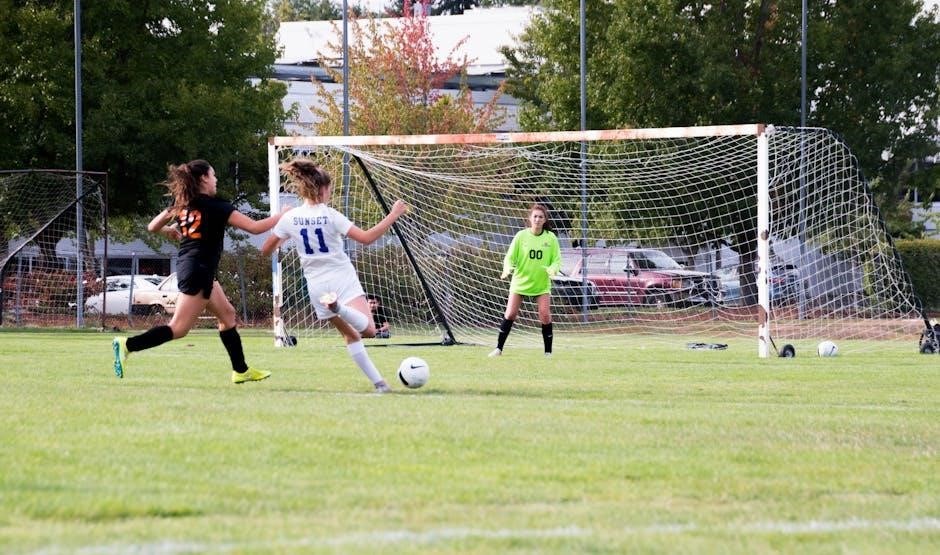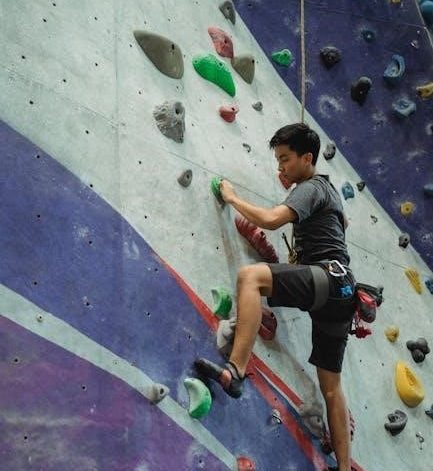Mental Toughness for Young Athletes: A Comprehensive Guide
Discover proven strategies to cultivate resilience and confidence in young athletes through mental toughness training. This comprehensive guide offers practical exercises and expert insights to help young athletes thrive in competitive sports and beyond.
Understanding Mental Toughness
Mental toughness is a complex and multifaceted concept that plays a crucial role in the performance and well-being of young athletes. It is often defined as the ability to overcome obstacles‚ adapt to challenges‚ and maintain focus under pressure. Research suggests that mental toughness encompasses a range of psychological traits‚ including resilience‚ confidence‚ and emotional control. These qualities enable athletes to navigate adversity‚ such as injuries‚ losses‚ or high-stakes competitions‚ while remaining composed and motivated.
Studies have identified that mentally tough individuals tend to exhibit consistent behavior in the face of adversity‚ demonstrating a unique ability to stay focused on their goals. This mindset allows them to perform at their best‚ even when faced with unexpected setbacks. The concept of mental toughness has been explored by various researchers‚ who highlight its importance in both sports and life. For young athletes‚ developing this trait can not only enhance their athletic performance but also equip them with essential life skills‚ such as perseverance and self-belief.
Understanding mental toughness requires recognizing its dynamic nature. It is not an innate quality but rather a skill that can be cultivated through practice‚ experience‚ and guidance. By grasping its core components‚ young athletes can unlock their full potential and develop the resilience needed to thrive in competitive environments.
The Importance of Mental Toughness in Young Athletes
Mental toughness is essential for young athletes as it directly impacts their ability to perform at their best and navigate the challenges of competitive sports. It provides the resilience needed to overcome setbacks‚ such as injuries or losses‚ and maintain focus under pressure. Research highlights that mentally tough athletes are better equipped to handle adversity‚ adapt to changing situations‚ and stay motivated‚ even in the face of failure. This trait not only enhances athletic performance but also fosters personal growth by teaching perseverance‚ self-discipline‚ and emotional control.
The development of mental toughness allows young athletes to build confidence and maintain a positive mindset‚ which are critical for achieving success in sports and life. It helps them manage stress‚ recover from disappointments‚ and stay committed to their goals. Moreover‚ mentally tough athletes are more likely to embrace challenges as opportunities for growth‚ rather than viewing them as obstacles. By cultivating this quality‚ young athletes can unlock their full potential and develop the skills necessary to thrive both on and off the field.

Defining Mental Toughness
Mental toughness refers to a collection of psychological traits that enable individuals to perform optimally under pressure and overcome challenges. It involves resilience‚ focus‚ and emotional stability‚ allowing young athletes to maintain a steady mind and persevere through setbacks.
Key Characteristics of Mental Toughness
Mental toughness encompasses a range of psychological traits that enable young athletes to perform at their best‚ even in challenging situations. Resilience is a cornerstone‚ allowing athletes to bounce back from setbacks and maintain focus. Emotional stability ensures they remain calm under pressure‚ avoiding emotional highs and lows that can disrupt performance. Confidence and self-belief are critical‚ as they empower athletes to trust their abilities and make decisions decisively. Focus and concentration enable them to stay present and avoid distractions‚ while adaptability allows them to adjust strategies mid-performance. Intrinsic motivation drives them to push through discomfort and pursue long-term goals despite obstacles. A growth mindset fosters a belief that skills and abilities can improve with effort‚ enhancing perseverance. Together‚ these traits create a mental framework that equips young athletes to thrive in competitive environments and beyond.
Experts like Jim Loehr and Strycharczyk et al. highlight these characteristics as essential for optimal performance‚ emphasizing their role in overcoming pressure and achieving success.
How Mental Toughness Impacts Performance
Mental toughness significantly enhances a young athlete’s ability to perform at their highest potential. By fostering resilience‚ it allows them to overcome setbacks and maintain focus during critical moments. Athletes with high mental toughness exhibit better emotional control‚ reducing anxiety and staying composed under pressure. This stability enables more consistent performances and better decision-making. Additionally‚ mentally tough athletes tend to have higher confidence‚ which boosts their ability to execute skills effectively and take calculated risks. They are also more adaptable‚ adjusting strategies mid-game to counter opponents‚ and maintain focus despite distractions. Mental toughness further enhances perseverance‚ driving athletes to push through fatigue and challenges‚ leading to greater overall success. Research by Brown and Fletcher supports the idea that mental toughness training improves sport performance by developing psychological and psychosocial skills. Ultimately‚ mental toughness acts as a catalyst‚ transforming potential into tangible results and helping young athletes achieve their goals in both sports and life.
Developing Mental Toughness in Young Athletes

Structured programs focusing on psychological skills like goal-setting‚ visualization‚ and emotional regulation are essential. Coaches and parents play a vital role in fostering resilience and confidence‚ helping athletes build mental strength through consistent practice and positive reinforcement.
Practical Techniques for Building Mental Toughness
Mental toughness can be cultivated through specific‚ actionable strategies. Visualization techniques‚ where athletes mentally rehearse successful performances‚ enhance confidence and preparedness. Positive self-talk is another powerful tool‚ helping young athletes maintain focus and resilience during challenges. Goal-setting is equally important‚ with a mix of short-term and long-term objectives providing clear direction and motivation.
- Emotional regulation: Teaching athletes to manage emotions under pressure through breathing exercises and mindfulness can improve decision-making and composure;
- Resilience training: Encouraging athletes to view setbacks as opportunities for growth fosters a stronger mindset and adaptability.
- Performance journaling: Reflecting on practices and competitions helps identify strengths and areas for improvement‚ promoting self-awareness and accountability.
Coaches and parents should model mentally tough behaviors and provide consistent support. Incorporating these techniques into daily routines ensures young athletes develop the mental strength needed to excel in sports and life. Regular practice and positive reinforcement are key to building lasting mental toughness.

The Role of Coaches and Parents in Fostering Mental Toughness
Coaches and parents play a pivotal role in nurturing mental toughness in young athletes. Their guidance and support create an environment where resilience and confidence can flourish. By modeling mentally tough behaviors themselves‚ such as maintaining composure under pressure and embracing challenges‚ they set a powerful example for athletes to emulate.

- Positive reinforcement: Focusing on effort rather than outcomes helps build a growth mindset‚ encouraging athletes to view failures as learning opportunities.
- Open communication: Creating a safe space for athletes to express emotions and concerns fosters trust and emotional resilience.
- Teaching life skills: Integrating mental toughness training into daily routines‚ such as through goal-setting and reflection‚ equips athletes with tools for long-term success.
Coaches and parents should emphasize effort‚ progress‚ and perseverance. By doing so‚ they help young athletes develop the mental strength needed not only for sports but also for life’s challenges. Their influence is instrumental in shaping a resilient and confident mindset that extends beyond the playing field.




